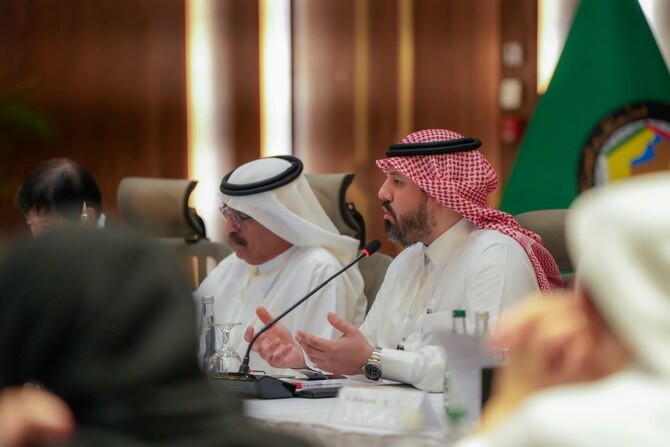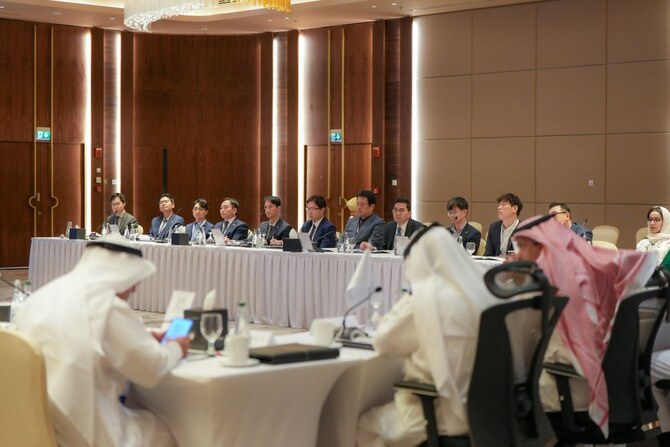RIYADH: Officials and nuclear experts discussed cooperation in nuclear energy and defense between South Korea and Saudi Arabia during an event in Riyadh on Tuesday.
The first Korea-Gulf Cooperation Council cooperation seminar organized by the Gulf Research Center and the South Korean embassy hosted around 80 participants to discuss trade relations, cooperation in the energy sector, and regional conflicts in the Middle East.
South Korea’s ambassador to Saudi Arabia, Choi Byung-hyuk, said the seminar was an opportune space to discuss economic cooperation and to come to a shared understanding of regional conflicts in the GCC, specifically Gaza and the Red Sea, as well as a space to diversify energy cooperation in the nuclear and renewables sectors.
Kang Han-ok, vice president for SMART development at the Korea Atomic Energy Research Institute, presented a joint research project currently underway between South Korea and Saudi Arabia on small modular reactors.
“SMRs are being highlighted as carbon-zero energy sources that complement the intermittent nature of renewable energy in the global power supply sector,” Kang said.
He noted how the SMART100 SMR, jointly designed by Saudi and South Korean entities, was approved by Seoul’s nuclear regulator in September.
The reactor was jointly developed by KAERI, the King Abdullah City for Atomic and Renewable Energy, and the Korea Hydro & Nuclear Power Corp.
Kang explained the reactor is now ready to be exported globally. “With its SDA acquaintance, SMART is now ready for global deployment in the demand of the power and thermal energy sectors,” he said.
Kang also spoke about ways to increase nuclear power plant cooperation between South Korea and GCC member states, citing the plan to establish a joint nuclear research and development center between the Saudi National Atomic Energy Project and KAERI.
The chairman of the Gulf Research Center, Abdulaziz Sager, emphasized that Saudi Arabia’s ability to rely on South Korea as a strong ally and defense supplier encouraged a relationship of trust and long-term partnership in the Kingdom’s security planning.
The seminar comes almost one year after the signing of a free trade agreement between South Korea and the GCC, signed on Dec. 28, 2023.
At the time, South Korea committed to eliminate 89.9 percent of tariffs on all products while the GCC committed to eliminate 76.4 percent, facilitating increased trade between the two parties.
The Korea-GCC FTA was 20 years in the making. Discussions for the agreement began in 2008, but it is yet to be verified or ratified. Lee Kwon-hyung, senior research fellow from the Korea Institute for International Economic Policy, put forward recommendations on how to pave the way for the agreement and how to best utilize it once finalized, including establishing an artificial intelligence data center to transition towards a green energy economy relying on solar, wind, and nuclear power for electricity generation.
“The AI data center needs a lot of electricity, so an energy transition and a digital transition are very imperative, and with the AI Data Center we can make industrial restructuring in both countries,” Lee said.
Prof. In Nam-sik, director general for strategic region studies at the Korea National Diplomatic Academy, evaluated the impact of geopolitical dynamics in the Middle East and East Asia on Korean-GCC relations, as well as the transformation of the US-led liberal international order.
On the war on Gaza, In said: “The situation threatens to shift the two-state solution toward an apartheid scenario, further destabilizing the region.”
On Iran, In continued: “Iran’s expanding influence through its regional proxy contributes to ongoing instability, with concerns that the current dynamics may accelerate Iran’s nuclear ambitions.
“The transition in Iran’s leadership raises uncertainties, with hopes for a gradual regime change that might reduce Iran’s revolutionary stance.”
Commenting on US influence, In said: “As the US pivots its strategic focus to Asia, Gulf nations are adopting flexible diplomacy, leveraging both US and Chinese influence.”
In stated that the Middle Eastern and European fronts are already linked, and North Korean military support to Russia signals an increasing risk of interconnected conflicts across regions.
To combat these regional and international threats, In urged South Korea and the GCC to work together on security cooperation across information sharing and technology, joint maritime security exercises, and shared support for multilateral forums, in addition to continued political dialogue in the above mentioned areas.




































